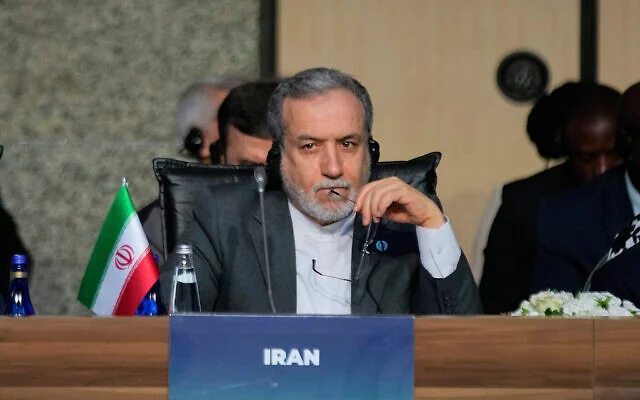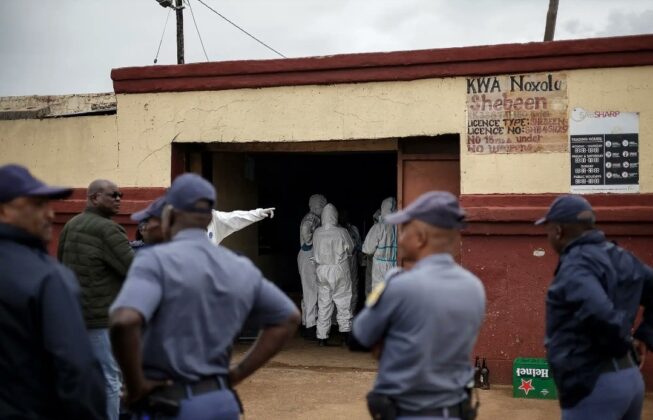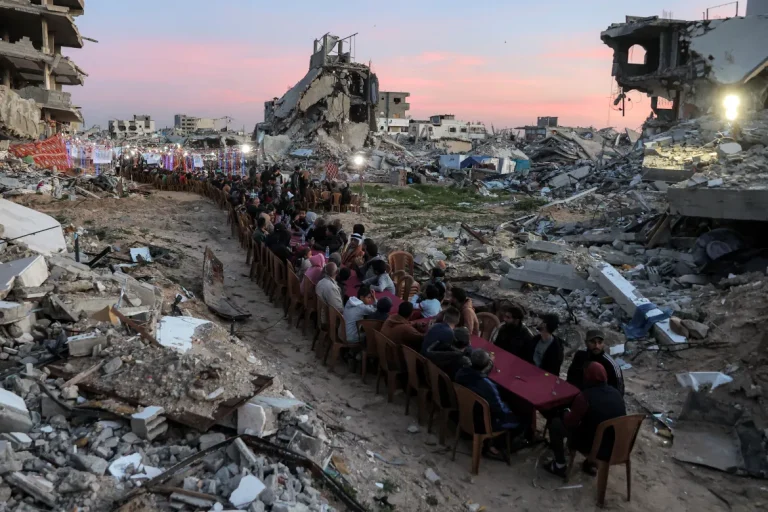
Iranian Foreign Minister Abbas Araghchi warns of “everlasting consequences” after U.S. airstrikes on nuclear sites, calling the attacks a grave violation of international law and urging UN action. image: AP Photo
Iran’s Foreign Minister Abbas Araghchi warned of “everlasting consequences” on Sunday after U.S. President Donald Trump confirmed that American forces had launched a large-scale military operation targeting Iran’s key nuclear sites at Fordow, Natanz, and Isfahan. In a statement posted on X, Araghchi accused the United States of committing a “grave violation” of international law, the UN Charter, and the Nuclear Non-Proliferation Treaty, describing the attack as an assault on Iran’s peaceful nuclear infrastructure. He stated that Iran reserves all options under international law to defend its sovereignty, people, and national interests, calling the events “outrageous.”
In response to the strikes, Iran’s Ambassador to the United Nations, Amir Saeid Iravani, formally requested an emergency meeting of the UN Security Council, calling for international accountability. In a letter obtained by the Associated Press, Iravani urged the Council to “take all necessary measures” to hold the United States responsible for what he termed “heinous attacks and illegal use of force.” He linked the U.S. strikes to Israel’s prior bombardment of Iranian nuclear facilities on June 13, which Tehran says caused extensive damage and targeted peaceful infrastructure. Iran condemned both attacks, describing them as premeditated and unprovoked acts of aggression.
Iranian state media confirmed that the Fordow, Natanz, and Isfahan nuclear sites were struck by enemy forces but emphasized that the sites had been evacuated in advance. According to the state broadcaster IRIB, enriched uranium stockpiles were removed prior to the attack, and there were no signs of radioactive contamination. Hassan Abedini, deputy political head of IRIB, said that Iran had taken precautions to ensure that no hazardous materials remained at the sites that could endanger the public. The National Nuclear Safety System Center released a statement confirming that radiation monitors had detected no contamination and that surrounding communities were safe.
Despite these official claims, reports from the semi-official Fars News Agency indicated that flames and smoke were visible at the Fordow facility following the strikes. A Fars journalist reported hearing anti-aircraft fire around 2:05 a.m. local time, followed by explosions and the sight of smoke and dust rising from the area. The reporter said that flames appeared shortly after the blasts. An Iranian parliamentarian representing Qom, near the Fordow site, told local media that the damage appeared to be confined to surface structures and could be repaired.
The U.S. operation, reportedly codenamed “Operation Midnight Hammer,” involved over 125 aircraft, including B-2 bombers that dropped powerful bunker-buster bombs on underground nuclear infrastructure. Some aircraft were used as decoys, while others launched Tomahawk missiles at Isfahan. Trump, speaking from the White House, said the mission was a success and warned that more attacks would follow if Iran does not agree to peace.
The strikes come after a week of intense regional escalation. On June 13, Israel launched a sweeping military campaign against Iranian nuclear and military sites, citing national security concerns. Iran has since retaliated with over 470 ballistic missiles and around 1,000 drones fired at Israeli territory. According to Israeli health officials, 24 people have died and thousands have been wounded, with missile strikes damaging homes, universities, and hospitals.
Although Iran has long denied seeking nuclear weapons, international observers and Western governments accuse Tehran of enriching uranium to weapons-grade levels and limiting access for international inspectors. They also point to Iran’s expanding ballistic missile program and increasingly hostile rhetoric toward Israel as evidence of a military nuclear agenda.
Following the U.S. strikes, a commentator on IRIB declared that all American military personnel and civilians in the region were now “legitimate targets.” A map of U.S. bases across the Middle East was broadcast as the anchor declared, “You started it, and we’ll finish it.” Iran’s Supreme Leader Ayatollah Ali Khamenei has not made a public statement but is reported to be in a secure location amid fears of an Israeli assassination attempt. The United Nations Security Council is expected to convene an emergency session in the coming days to address the escalating crisis.
Iranian Foreign Minister Abbas Araghchi warns of “everlasting consequences” after U.S. airstrikes on nuclear sites, calling the attacks a grave violation of international law and urging UN action.
image: AP Photo
Iran’s Foreign Minister Abbas Araghchi warned of “everlasting consequences” on Sunday after U.S. President Donald Trump confirmed that American forces had launched a large-scale military operation targeting Iran’s key nuclear sites at Fordow, Natanz, and Isfahan. In a statement posted on X, Araghchi accused the United States of committing a “grave violation” of international law, the UN Charter, and the Nuclear Non-Proliferation Treaty, describing the attack as an assault on Iran’s peaceful nuclear infrastructure. He stated that Iran reserves all options under international law to defend its sovereignty, people, and national interests, calling the events “outrageous.”
In response to the strikes, Iran’s Ambassador to the United Nations, Amir Saeid Iravani, formally requested an emergency meeting of the UN Security Council, calling for international accountability. In a letter obtained by the Associated Press, Iravani urged the Council to “take all necessary measures” to hold the United States responsible for what he termed “heinous attacks and illegal use of force.” He linked the U.S. strikes to Israel’s prior bombardment of Iranian nuclear facilities on June 13, which Tehran says caused extensive damage and targeted peaceful infrastructure. Iran condemned both attacks, describing them as premeditated and unprovoked acts of aggression.
Iranian state media confirmed that the Fordow, Natanz, and Isfahan nuclear sites were struck by enemy forces but emphasized that the sites had been evacuated in advance. According to the state broadcaster IRIB, enriched uranium stockpiles were removed prior to the attack, and there were no signs of radioactive contamination. Hassan Abedini, deputy political head of IRIB, said that Iran had taken precautions to ensure that no hazardous materials remained at the sites that could endanger the public. The National Nuclear Safety System Center released a statement confirming that radiation monitors had detected no contamination and that surrounding communities were safe.
Despite these official claims, reports from the semi-official Fars News Agency indicated that flames and smoke were visible at the Fordow facility following the strikes. A Fars journalist reported hearing anti-aircraft fire around 2:05 a.m. local time, followed by explosions and the sight of smoke and dust rising from the area. The reporter said that flames appeared shortly after the blasts. An Iranian parliamentarian representing Qom, near the Fordow site, told local media that the damage appeared to be confined to surface structures and could be repaired.
The U.S. operation, reportedly codenamed “Operation Midnight Hammer,” involved over 125 aircraft, including B-2 bombers that dropped powerful bunker-buster bombs on underground nuclear infrastructure. Some aircraft were used as decoys, while others launched Tomahawk missiles at Isfahan. Trump, speaking from the White House, said the mission was a success and warned that more attacks would follow if Iran does not agree to peace.
The strikes come after a week of intense regional escalation. On June 13, Israel launched a sweeping military campaign against Iranian nuclear and military sites, citing national security concerns. Iran has since retaliated with over 470 ballistic missiles and around 1,000 drones fired at Israeli territory. According to Israeli health officials, 24 people have died and thousands have been wounded, with missile strikes damaging homes, universities, and hospitals.
Although Iran has long denied seeking nuclear weapons, international observers and Western governments accuse Tehran of enriching uranium to weapons-grade levels and limiting access for international inspectors. They also point to Iran’s expanding ballistic missile program and increasingly hostile rhetoric toward Israel as evidence of a military nuclear agenda.
Following the U.S. strikes, a commentator on IRIB declared that all American military personnel and civilians in the region were now “legitimate targets.” A map of U.S. bases across the Middle East was broadcast as the anchor declared, “You started it, and we’ll finish it.” Iran’s Supreme Leader Ayatollah Ali Khamenei has not made a public statement but is reported to be in a secure location amid fears of an Israeli assassination attempt. The United Nations Security Council is expected to convene an emergency session in the coming days to address the escalating crisis.



